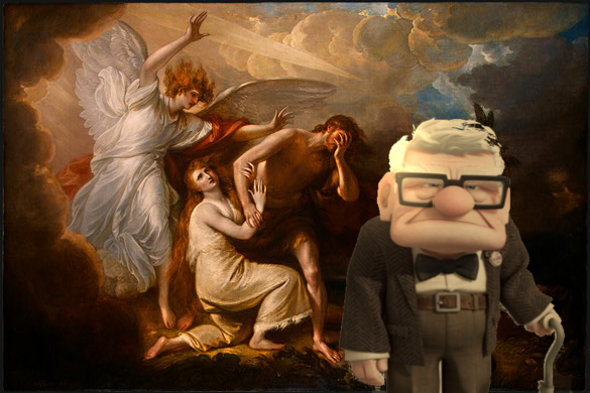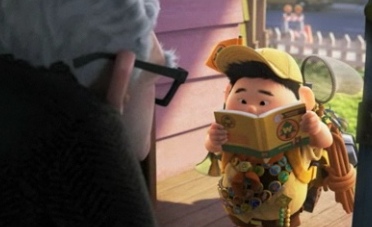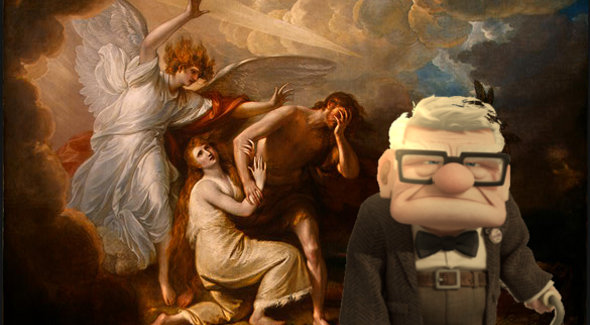Cross your heart
“Die hee or Justice must; unless for him
Som other able, and as willing, pay
The rigid satisfaction, death for death.”
John Milton, Paradise Lost, Book IX

When Carl Fredrickson is about to be hauled away by the orderlies to the Shady Oaks retirement community (or whatever adjective/tree it was), it forces key questions in his life. He has delayed dealing with them for some time.
I was surprised by Up, because Carl didn’t turn out to have the values I assumed he would have. He didn’t turn out to be defined by his immediate level of whimsy (either as too serious or too silly). He didn’t turn out to particularly love flying or find it liberating in itself. In fact, he wasn’t really looking for freedom at all. He doesn’t particularly value youth, and he has spare few epiphanies in a picture you’d expect to be full of “I thought that was important, but really this is what’s important” Hallmark Channel speeches.
No, when asked “What now?” His answer is not “Be young, have fun, drink Pepsi,” as the marketing might lead you to believe. It is decidedly more old-fashioned.
When Carl is forced to take drastic action during a rather pointless time in his life, he decides to keep his word.
And later, when he agrees to help Russell save Kevin the bird, he really doesn’t give a rat’s ass about the bird. He hates the bird, and he doesn’t like Russell very much. But, in a moment of sympathy, he makes a promise, and he decides that this promise means something.
(Notably, he does not act on his promise to Russell until he has fulfilled his promise to Ellie. It seems terribly insensitive, but it makes sense in the context of how Carl operates. The house needs to stand next to Paradise Falls, as in Ellie’s picture, before Carl can serve any other promise. It’s almost a cosmic law to him.)

I was made on the Sixth Day! SQUIRREL!!
One of Carl’s most important personal moments is when he accepts Masterhood of Doug the dog (another callback to Adam – who was given dominion over the animals). Bonds and duties matter.
Later still, when Russell’s father does not show up to his Senior Wilderness Explorer ceremony, Carl goes – and I really think it is for a similar reason. Carl believes in promises. He believes in duty. He values loyalty and takes it almost as a natural law that certain people ought to be loyal to certain other people. He uses this truism, this thing he intuitively understands but which doesn’t entirely make sense discursively, to supplant the place of a “point” in his life.
And his attitude toward duty is Miltonic. When he does something in service to a promise or oath, it is not through subordination to a binding tie – trust for Carl is a monistic relationship, where the act of promising to do something for someone else and accepting someone else’s promise to do something for you (as Carl does when he lets Russell “assist the elderly” to get his merit badge) are the same sort of feeding.
The “up” in Up becomes an aspiration and drive toward this commitment, this trust, even when, in the larger context of his life, it is pretty pointless.
All because he crossed his heart.
But even that is too dialectical an explanation! Who is the giver of trust? Who is the receiver of trust? Why is the heart crossed – does this not run in the interests of the heart as well? Perhaps not. The moments are delicately and subtly handled – best to watch the movie again, and really listen and watch for the details, especially for what Carl does not say or do that would be clear givens for other characters.
And I would resist saying that Carl “makes it the point of his life” – supplant the place of, sure, but in a different way. Carl doesn’t find meaning to fight the meaninglessness. This is too dialectical, at least within a certain common-sensical paradigm. As in the Milton quotation above, Justice is just something that needs to be done.
That Milton quotation at the top of the page, by the way, is about how even God the Father Himself observes the pressing necessity of Justice, without seeing it as a limitation or bind on Him. He does not observe those sorts of dialectical relationships and instead lives in a divine cycle of feeding and vaporizing, of spiritual physicality, of constant and cosmic mutuality, where something like Justice can just exist and be good without having to operate along a subject-object axis.
And by the way, if you have any doubt that the main reason Carl helps Russell is because he crossed his heart and promised to do it – or that this faithfulness is the primary virtue exhibited in the story, the screenwriters left you this fun bit of foreshadowing at the moment of Russell’s introduction:
 Russell: [from trailer] Good afternoon. Are you in need of any assistance today, sir?
Russell: [from trailer] Good afternoon. Are you in need of any assistance today, sir?
Carl Fredricksen: No.
Russell: I could help you cross the street.
Carl Fredricksen: No.
Russell: I could help you cross your yard?
Carl Fredricksen: No.
Russell: I could help you cross…
Carl Fredricksen: No!
[closes the door on Russell’s foot]
Russell: Ow.
He could help him cross his heart. He could assist him in making a promise to help him in return. If that isn’t a Miltonic act of benevolence, I don’t know what is.

Bravo.
What more can I say?
Overthinkinit.com: Pop Cultures answer to Rinzai Zen.
@Michael Williams
One thing I have always kind of exasperatedly yelled at people (which is probably why they don’t listen) is that you don’t have to get all orientalist for this kind of thinking. There are rich traditions of this sort in all cultures – there is nothing new under the sun.
I think that defying the notion that the people and culture who do cool things are people and cultures other than you and yours is one of my major motivations in writing for Overthinking It.
Well, that and the ladies. I do it for the ladies.
Yes of course. You need not go Said on me.
However, the severity of analysis does from time to time border on the Koan-like imho.
Tit for tat aside.
Who’s leg do you have to hump to get some McLuhan fused analysis around here?
I have yet to see Up myself, but just one viewing of the trailer was enough to solidify my opinion that whatever sandbox Pixar decides to play in, the end result will invariably touch upon that deep part of the human condition that, as you said, only art is able to express (or reflect). It’s funny how a metaphor- by definition an indirect representation of something else- is often the most effective means of conveying truth. Thank you for writing this, Fenzel. I now have something more to ponder on my way out of the theater when I finally have the time to see this masterpiece.
And there are still piles of snob critics out there who don’t believe anything with the name Disney (even adding Pixar) on it can be any good, or contain any serious ideas. This should start to show them.
Best final fantasy reference ever?
Up was incredible. Your analysis has some great stuff, particularly about epistemology stunting discourse, and art being a language unto itself. I completely agree, but your conclusion feels like a cop-out. If we are to subside and let the art speak for itself, then why bother writing to begin with – only to say ‘look out for these themes and see it for yourself’? I believe ideas have to be realized for each person, that the infectiousness of a truth is not contingent solely on just how much sense it makes. And so I agree that a person ought to experience a work of art in his or her own time and feel what truth is appropriate to his or her biography and present.
So why write? Personally, I write because I feel that art is being mistreated, that the masses’ approach to art is inappropriate to the art (although much art is being adapted for appropriateness to the common approach). If you have a feeling or idea, a response to Up, treat it purely. Your subjective response is in itself its own work of art, and I can learn from it. I feel as though you’re holding back.
I’m being very nitpicky though. Your thoughts are a pleasure to read, and you’ve made me want to read Paradise Lost. I’m ignorant to Milton’s work, so because of this, I at least now have interest. Thanks for the stimulating read, this strikes me as being unlike any other place writing about movies, and I think you’ve got a reader in me now.
I know nothing about Milton’s Paradise, but I found this review to be one of the most insightful ones online about Pixar’s UP. And I should know, because I scoured the web for information on UP in order to prepare for writing my own review. You can read it here.
The Spirit of Pixar’s UP
I decided to copy your style by including quotes in my review from a classic work, but in my case it is “Romeo and Juliet”. I elaborated on your Adam and Eve theme and suggested that this is A&E in reverse. Where the protagonist is heading toward the Garden of Eden instead of being thrown out of it. I also compared the story to Don Quixote and the Wizard of Oz.
I hope you get a chance to read my review and comment on it.
Yes. Best Final Fantasy reference,… well not ever but in a damn long while. I actually had to cover my mouth to quiet the horrible giggling that friggin’ picture caption got out of me, for fear of waking up other people in my house.